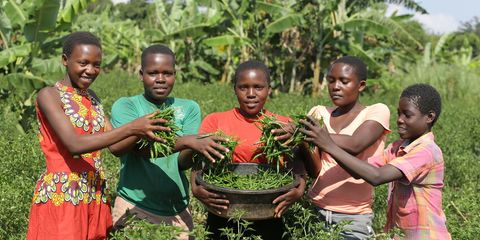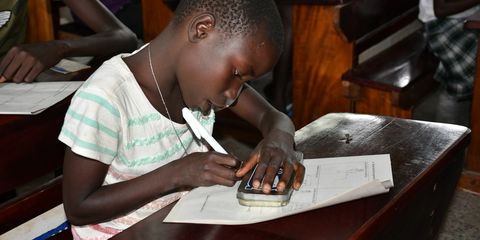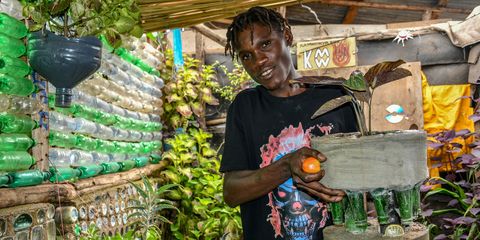Plan International Uganda is responding to the influx of refugees in Northern Uganda as a result of the political crisis that broke out in 2013 in South Sudan. We are currently supporting over 35,000 refugees, 60% of whom are children, through child protection, early childhood care and development, the provision of critical relief items and water, sanitation and hygiene interventions.
Early childhood care and development
Plan International Uganda is providing children with early childhood learning. With the support of 161 trained caregivers, children learn basic numeracy and reading. They also take part in singing and structured play.
Over 10,000 children aged 3-5 have benefited from the 30 early childhood care and development (ECCD) centres located in Adjumani, Bidibidi & Rhino settlements.
The ECCD centres have been certified by the Ministry of Education, Sports, Science, Technology and begin their activities at 8.00am and end at 11.00am. “Our unique ECCD model supports children to have a healthy start in life, acquire early stimulation, improved social skills and readiness for school. We ensure children’s access to education in a safe and protected learning environment in the refugee settlements,” says Rashid Javed, Country Director of Plan International Uganda.
Management committees have been established for each of the ECCD centres. The committees, each containing 11 members, monitor the activities at each centre, mobilise the community and ensure the maintenance of the centres.
Child protection
Plan International Uganda has established 18 child friendly spaces (CFS) and equipped them with indoor and outdoor play materials so children can participate in recreational activities.
The CFS are also used to address psychosocial needs of children who have experienced distress, sexual abuse, children separated from their families, those who have been trafficked, exposed to physical violence and those forced into armed groups.
To date, 15,652 children aged 3 -18 years have benefited from the CFS.
“I come here in the evenings to play volleyball and meet my friends from different tribes and this helps us not to discriminate against each other,” says Martha, 16, from Ayillo II Settlement.
Dramadri Albert, 15, says he enjoys different games at a CFS every day. “When I come to the play centre, I forget about things that stress me. I have been able to develop my talent in football and I am able to socialise. I also encourage other children to come to the space and play,” says Albert.
In addition, community structures including child protection committees have been established and equipped to support the protection mechanisms in place.
Water, sanitation and hygiene interventions (WASH)
Provision of sanitation and clean water has been one of Plan International Uganda’s flagship programmes for the South Sudan response since 2014 with the goal of keeping the populations affected by the conflict healthy.
Here are some of our main achievements so far:
- 15 boreholes have been drilled for provision of safe, lifesaving water for the refugee communities in Adjumani and Yumbe.
- At least 15,000 people have accessed water from the 15 boreholes.
- 30 mechanics have been trained and equipped with tools to carry out repairs and maintenance on the boreholes.
- 30 community members have been trained to promote good hygiene practices among refugee communities.
In addition, community structures including water user committees, have been established and equipped to ensure the sustainability of the WASH interventions.
Non food items
Distributing non food items is part of the immediate response to the influx of refugees in newly established settlements. The items help to address essential protection needs of children and their parents in the newly established settlements.
Nearly 24,000 people have benefited from non-food items including blankets, tarpaulins, tents, soap, kitchen sets, mosquito nets and jerry cans.
Funders
Plan International recognises the significance of solving problems during emergencies through partnerships and donor support. We extend our appreciation to our funders and partners for exceptional commitment towards changing lives of children affected by this emergency.


